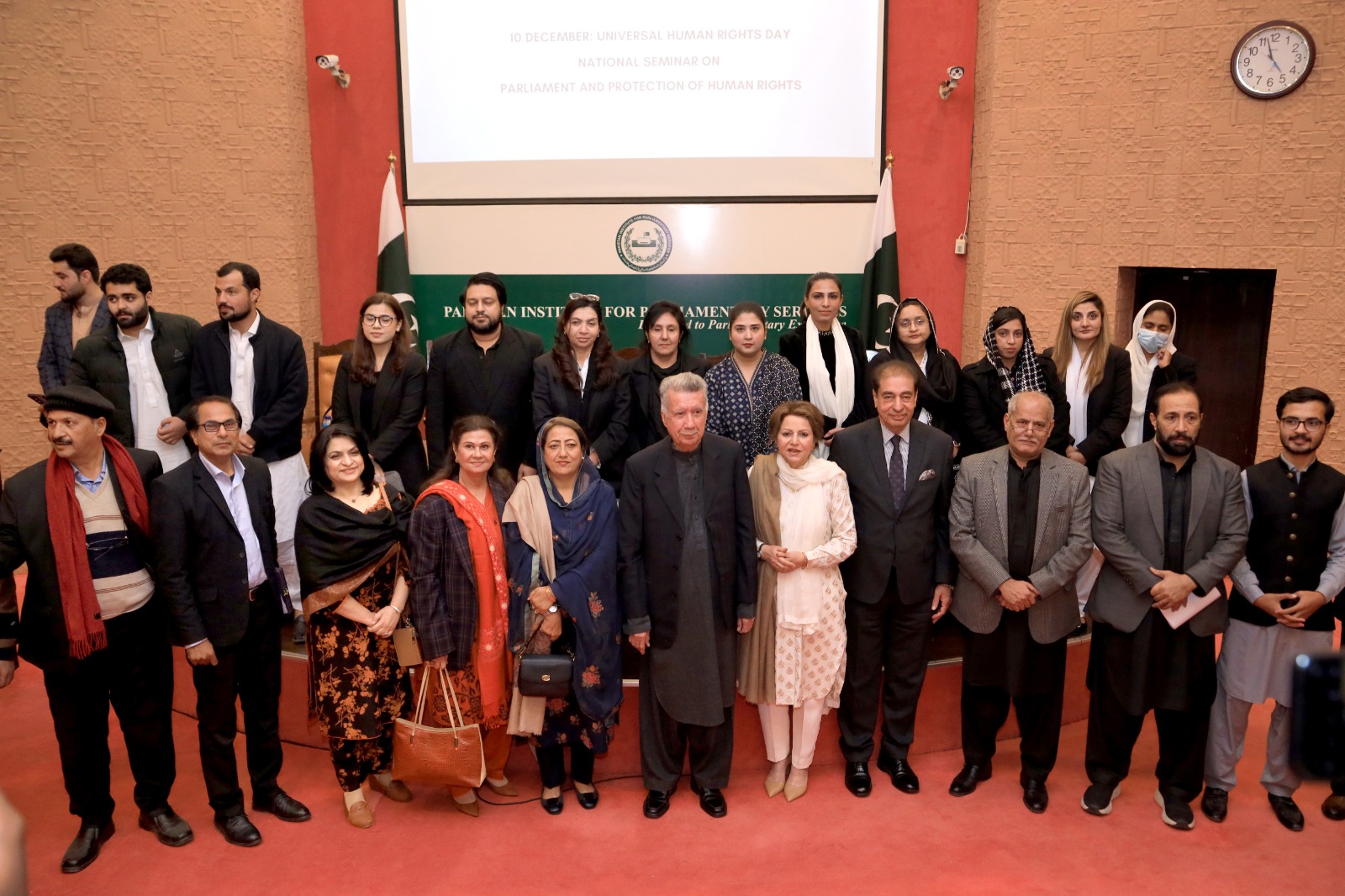 10 December 2024,Islamabad (Kamran Raja) : Seminar was graced by Mr. Afrasiab Khattak, former member Senate of Pakistan, as the chief guest. Among the other distinguished speakers were Ms. Shaista Pervaiz, Ms. Asiya Nasir, Mr. Riaz Fatyana, Dr. Shoaib Suddle, Mr. Shafique Chaudhry, ED PCHR and Mr. Zafar Ullah Khan.
10 December 2024,Islamabad (Kamran Raja) : Seminar was graced by Mr. Afrasiab Khattak, former member Senate of Pakistan, as the chief guest. Among the other distinguished speakers were Ms. Shaista Pervaiz, Ms. Asiya Nasir, Mr. Riaz Fatyana, Dr. Shoaib Suddle, Mr. Shafique Chaudhry, ED PCHR and Mr. Zafar Ullah Khan.
Mr. Riaz Fatyana, who welcomed the seminar participants, highlighted the ongoing decline in the state of human rights in Pakistan, noting that the space for democratic governance continues to shrink. He stressed that Human Rights Day serves as a crucial occasion to reaffirm the nation’s commitment to safeguarding the human rights of all citizens. “Human rights are the foundation of any democracy,” he asserted. “Unfortunately, our journey to fully realize human rights remains in its nascent stages.”
Mr. Muhammad Shafique Chaudhry, shared the journey of the Parliamentarians Commission for Human Rights since its inception and highlighted the key legislative achievements through PCHR intervention. Later in his presentation, Mr. Shafique provided a brief overview of the current state of human rights in Pakistan. He lamented that, despite various calls and international attention, the state has failed to take significant or credible actions to address persistent human rights violations. Citing reports from independent human rights bodies, he pointed out that Pakistan continues to struggle with its human rights record. He referenced the 2024 Press Freedom Index by Reporters Without Borders, which ranked Pakistan 152nd out of 180 countries, a slight drop from 150th place in 2023. Additionally, the Economic Intelligence Unit’s Democracy Index for 2023 downgraded Pakistan from a “hybrid regime” to an “authoritarian regime,” marking the most significant regional regression.
Dr. Shoaib Suddle in his address acknowledged that, while Pakistan has the core elements of democracy in place, challenges in governance, the rule of law, accountability, and integrity within public office remained major obstacles. He noted that Parliament needs to assert its constitutional powers and mandate as custodian of peoples’ rights. In terms of providing safeguarding the current system has so failed to deliver.
Mr. Zafar Ullah Khan highlighted that while Pakistan possesses an abundance of laws, well- crafted constitutional guarantees, and an elaborate legal system, the country still ranks among the worst globally in terms of human rights and governance. He pointed out that numerous commissions have been established, yet the expected outcomes have not been realized. In light of this, he stressed the urgent need to revisit existing policies to ensure the full realization of human rights in the country, emphasizing that legal frameworks alone are not enough without effective implementation.
Ms. Zahra Wadood, a Member of the National Assembly (MNA), echoed the importance of personal accountability and responsible behavior, especially when engaging in dissenting opinions. She noted that both public and parliamentary discourse often lack the necessary respect and decorum, with people failing to uphold the standards of civil discussion.
underscored that fostering a culture of mutual respect and personal responsibility in dialogue is crucial to strengthening democratic practices and creating a more constructive and inclusive atmosphere in both public and legislative settings.
Mr. Afrasiab Khattak, the chief guest, underscored that the failure of democracy in Pakistan can largely be attributed to the ruling elite. He called for an immediate cessation of political engineering, emphasizing that the current political system cannot be classified as truly democratic, but rather resembles a form of “hybrid martial law.” He highlighted our ruling elite has not learned any lesson from the history and argued that unless Pakistan revisits its strategic depth policy, the country’s governance and human rights situation will remain stagnant, with Parliament continuing to serve as a rubber stamp for a select few. Mr. Khattak concluded by emphasizing the necessity of continuity in the democratic process and a grand dialogue among all the segments of society for the democracy and protection of human rights.
To acknowledge the efforts of parliamentarians in addressing the issues of marginalized communities and advancing pro-human rights legislation, the Special Parliamentary Human Rights Award was presented to Ms. Asiya Nasir, Mr. Afrasiab Khattak, and Ms. Shaista Pervaiz.